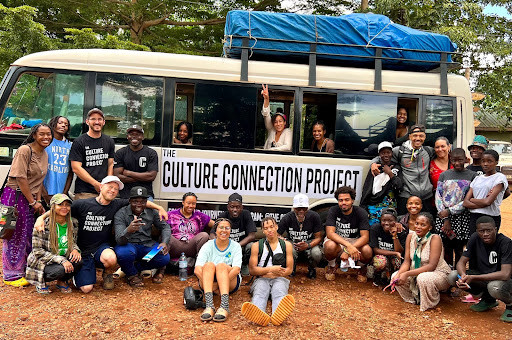Appreciation Over Influence: The Culture Connection Project's Global Mission of Mutual Growth

International development and cultural exchange present a complex dynamic. One side arrives with ideas, resources, and well-meaning intentions, assuming it knows what's best for the other. Unknown to many, this approach can echo the problematic undertones of cultural imposition and, in some instances, white saviorism. The Culture Connection Project (The CCP) redefines what it means to create cross-cultural connections by emphasizing appreciation over influence.
The 501(c)(3) nonprofit's mission is to educate, connect, and appreciate while celebrating diversity in skin color, nationality, cultural backgrounds, religious beliefs, and lived experiences. Three principles guide The CCP's approach. First, everyone, regardless of background or credentials, has something to offer and learn. Second, the goal is never to change cultures but to uphold them. Last but not least, there's no place for saviorism; only for inquiry, humility, and growth.
These values are embedded in The CCP's Uganda Program, a two-week immersive experience that has been over a decade in the making. The trip takes participants through four regions of Uganda, from bustling cities to remote villages. Along the way, they visit and volunteer with six Ugandan-led nonprofits, learning from local change agents already impacting their communities. Participants also design and lead activities with students in the villages of rural Bududa.
This program challenges the traditional narrative of international aid by building appreciation and understanding across differences. It does so by bringing people from all over the world, each with their backgrounds, experiences, and assumptions, and facilitating their engagement with Ugandan leaders shaping their communities from within. Essentially, instead of regarding them as people being helped, they're regarded as peers, mentors, and collaborators.
"We're unlike missionary groups and other international organizations. We've known these people for decades. We've watched their kids grow up, we've eaten in their homes, and we've lived life with them. That kind of trust and love means we don't have to make decisions for them. They lead, we listen," says Joshua Sims, co-founder and CEO.
It's worth noting that The CCP's mission is global, and its reach is expanding. For instance, in India, participants will soon be guided through the Bastar region of Chhattisgarh, immersing themselves in tribal communities and working alongside local change agents on their terms. Back in the United States, The CCP also hosts community meetups, fostering dialogue across racial, cultural, and ideological divides.
The Culture Connection Project's unique approach is shaped by Sims' journey. When he first visited Uganda in 2012, he was just another well-meaning individual, arriving to teach mathematics in a rural village. "I didn't know enough to be sure I'd do more good than harm, realizing how much power I held just by my skin color and nationality," Sims shares. This led him to question, learn, and reimagine what international engagement should look like.
Sims understood the unintended consequences of generous-seeming aid. For example, modernization or humanitarian efforts, when uncritical, can fracture communities, disrupt cultures, and introduce class divisions. "You think you're helping by bringing technologies like solar panels, laptops, or tablets," he explains. "But if only three families get them, you've just created inequality and greed where there was none." The answer is to do things more thoughtfully and in true partnership with the people affected.
The impact of The CCP's programs, particularly the Uganda trip, is felt in the testimonies from participants, shared through the annual orientation event, the Family Circle. Each year, before the trip officially begins, participants gather in a circle and introduce themselves.
During The CCP's Family Circle in 2022, co-founder and COO Deion James shared his story. He stood there, surrounded by young people from neighborhoods like the one he grew up in, Milwaukee, Wisconsin. James opened up about his journey of navigating depression, loss, rejection, and displacement, from never meeting his father and losing his mother in 2016 to losing his job, home, and car.
James' old roommate from prep school, Sims, invited him to come to Uganda, changing his life. "I didn't know what to expect," James says. "We arrived in Bududa, and what I saw was strength, community, and joy. I met children with no shoes and no complaints. I came angry, and I left grateful." He told the young men and women in the circle that this journey would change them.
James recalls the story of one participant, a then-18-year-old from Milwaukee, who found himself overwhelmed at a soup kitchen while feeding children in Uganda. Hugging the wall, unsure how to process the moment, he stepped away to regroup. He boarded the bus and found James waiting. He didn't have to say much. He sat down and said, "When I get rich, I'm going to help these people."
"That young man later joined the Air Force," James states. "He still talks to a Ugandan student he met on that trip who became his lifelong friend." Such stories illustrate what makes The CCP different. It builds authentic, mutual relationships.
The Culture Connection Project offers a new model for cross-cultural engagement. It believes that the most lasting change begins not with grand gestures but with genuine connection and a willingness to listen first.
© Copyright IBTimes 2024. All rights reserved.





















